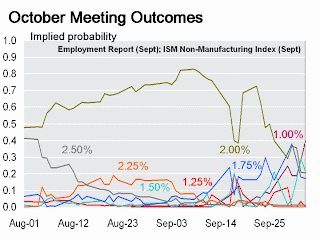by Calculated Risk on 10/04/2008 05:18:00 PM
Saturday, October 04, 2008
Will there be an Intermeeting Fed Rate Cut?
The next Fed meeting is more than three weeks away (a two day meeting on October 28th and 29th) and the economic data suggests the economy is deteriorating rapidly. And the TARP will not start buying assets for several weeks, maybe not until mid-November. This suggests the possibility of an intermeeting Fed rate cut.
Fed Chairman Bernanke released a statement on Friday:
We will continue to use all of the powers at our disposal to mitigate credit market disruptions and to foster a strong, vibrant economy.The Financial Times notes: Declining economy could force Fed to act
The last time the macro-economic data deteriorated rapidly – around the turn of the year – the Fed reacted decisively with big rate cuts, including an intermeeting move. In the eyes of many the latest data also adds up to an open-and-shut case for further Fed rate cuts.And here are the latest Fed Fund probabilities from the Cleveland Fed.
...
If the Fed does decide to cut, the case for cutting at the meeting is that a new set of economic forecasts could win over doubters. But if the Fed wants to maximise the impact of the cut it could move intermeeting in the hope of shocking the credit markets back to life.
emphasis added
 Click on graph for larger image in new window.
Click on graph for larger image in new window.Until a couple of weeks ago, market participants anticipated no change in the Fed Funds rate in October.
Now, because of recent events, there is a strong consensus for a rate cut by the October meeting.
But if you are going to lower rates at the end of October, why wait?
Back in 2004, Bernanke wrote a paper (with NBER economist Kenneth Kuttner) What Explains the Stock Market’s Reaction to Federal Reserve Policy?
The most direct and immediate effects of monetary policy actions, such as changes in the federal funds rate, are on the financial markets; by affecting asset prices and returns, policymakers try to modify economic behavior in ways that will help to achieve their ultimate objectives.To surprise the market, the Fed might need to cut by at least 50 bps - maybe 75 bps - and announce the action before the market opens on Monday.
...
The unexpected 50-basis-point intermeeting rate reductions on 3 January [2001] and 18 April [2001] were both greeted euphorically, with one-day returns of 5.3% and 4.0% respectively. The 50-basis-point rate cut on 20 March [2001] was received less enthusiastically, however. Even though the cut was more or less what the futures market had been anticipating, financial press reported that many equity market participants were “disappointed” the rate cut hadn’t been an even larger 75 basis point action. Consequently, the market lost more than 2%.
...
Another unusually vehement reaction to a Fed action is associated with the 25-basis-point intermeeting rate cut on 15 October 1998, which was taken in response to unsettled conditions in the financial markets — specifically, the deteriorating situations in Asia and Russia. For whatever reason, the unexpected intermeeting cut lifted equities over 4%.
...
This study has documented a relatively strong and consistent response of the stock market to unexpected monetary policy actions, using federal funds futures data to gauge policy expectations.


